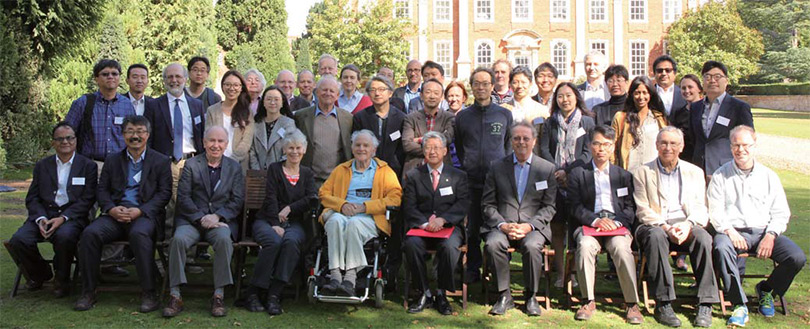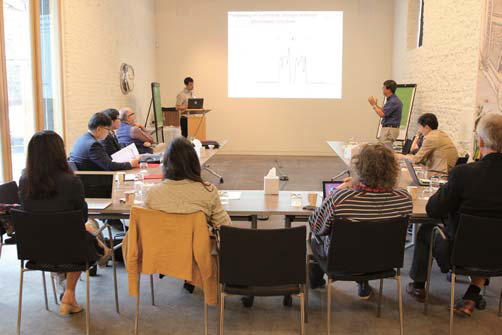주메뉴
- About IBS 연구원소개
-
Research Centers
연구단소개
- Research Outcomes
- Mathematics
- Physics
- Center for Underground Physics
- Center for Theoretical Physics of the Universe (Particle Theory and Cosmology Group)
- Center for Theoretical Physics of the Universe (Cosmology, Gravity and Astroparticle Physics Group)
- Dark Matter Axion Group
- Center for Artificial Low Dimensional Electronic Systems
- Center for Theoretical Physics of Complex Systems
- Center for Quantum Nanoscience
- Center for Exotic Nuclear Studies
- Center for Van der Waals Quantum Solids
- Center for Relativistic Laser Science
- Chemistry
- Life Sciences
- Earth Science
- Interdisciplinary
- Center for Neuroscience Imaging Research (Neuro Technology Group)
- Center for Neuroscience Imaging Research (Cognitive and Computational Neuroscience Group)
- Center for Algorithmic and Robotized Synthesis
- Center for Genome Engineering
- Center for Nanomedicine
- Center for Biomolecular and Cellular Structure
- Center for 2D Quantum Heterostructures
- Center for Quantum Conversion Research
- Institutes
- Korea Virus Research Institute
- News Center 뉴스 센터
- Career 인재초빙
- Living in Korea IBS School-UST
- IBS School 윤리경영


주메뉴
- About IBS
-
Research Centers
- Research Outcomes
- Mathematics
- Physics
- Center for Underground Physics
- Center for Theoretical Physics of the Universe (Particle Theory and Cosmology Group)
- Center for Theoretical Physics of the Universe (Cosmology, Gravity and Astroparticle Physics Group)
- Dark Matter Axion Group
- Center for Artificial Low Dimensional Electronic Systems
- Center for Theoretical Physics of Complex Systems
- Center for Quantum Nanoscience
- Center for Exotic Nuclear Studies
- Center for Van der Waals Quantum Solids
- Center for Relativistic Laser Science
- Chemistry
- Life Sciences
- Earth Science
- Interdisciplinary
- Center for Neuroscience Imaging Research (Neuro Technology Group)
- Center for Neuroscience Imaging Research (Cognitive and Computational Neuroscience Group)
- Center for Algorithmic and Robotized Synthesis
- Center for Genome Engineering
- Center for Nanomedicine
- Center for Biomolecular and Cellular Structure
- Center for 2D Quantum Heterostructures
- Center for Quantum Conversion Research
- Institutes
- Korea Virus Research Institute
- News Center
- Career
- Living in Korea
- IBS School
News Center
| Title | International collaboration in the field of basic research will contribute to making significant scientific discoveries | ||||
|---|---|---|---|---|---|
| Name | Department of Communications | Registration Date | 2015-09-20 | Hits | 2582 |
| att. |
 thumb.jpg
thumb.jpg
|
||||
|
“International collaboration in the field of basic research will contribute to making significant scientific discoveries” Report from the 2015 IBS-Royal Society Research Conference
From September 14 to 15, the 2015 IBS-Royal Society Research Conference was held at the Kavli Royal Society International Centre in Milton Keynes, the UK. The relationship between IBS and the Royal Society started with an MOU for joint research and human exchanges, which was concluded when Korean President Geun-hye Park visited the UK as a part of her trip to Western Europe in November 2013. The relationship has developed into a joint research conference that has been taking place in Korea and in the UK alternately. The first conference was held in Korea in October 2014. Addressing the three key topics of “nanoscience and nanotechnology,” “astro-/particle physics,” and “genome science,” the 2015 Conference brought together 34 speakers, including 9 IBS directors and 11 Fellows of the Royal Society, and more than 60 researchers raised in-depth questions and actively shared their research content. “Not all those who wander are lost.” This is a line from J. R. R. Tolkien’s The Lord of the Rings, which has encouraged a lot of readers. On the first day of the 2015 IBS-Royal Society Research Conference, Professor Harry Kroto, Fellow of the Royal Society (FRS), began his keynote speech with the above quotation and told his life story as a researcher. He said that in the course of enjoying research itself out of curiosity about nature and the universe, he was able to make an unexpected breakthrough even though this required a long process. Professor Anthony Cheetham, Vice President of the Royal Society, provided unstinting support for the organization of the joint conference. He said in his opening speech,“Since it was established in 1660, the Royal Society has sought excellence in science. Recently, the Society has been actively promoting international cooperation projects.” He also said, “It is a pleasure to have a cooperative relationship with IBS, an institute which was established for the development of basic research in Korea. Let us promote viable collaborative research activities.” IBS President Doochul Kim responded by saying, “It is very meaningful that this is the second consecutive year in which outstanding scientists from Korea and the UK are gathered again for scientific exchanges. Let us actively take part in the discussions of each session and make efforts to develop specific plans for collaborative research.” The IBS directors introduced the Centers that they are in charge of and the main research areas of each Center in detail. Professor Kroto enriched the session by commenting on every presentation and participating in discussions.
The first day of the genome science session was chaired by Robin Lovell-Badge (FRS, Francis Crick Institute) and Kyungjae Myung (IBS Director of the Center for Genomic Integrity), and the second day of the session was chaired by John Skehel (Vice President of the Royal Society) and Director Kyungjae Myung. Jesper Svejstrup (FRS, Francis Crick Institute) and Jin-Soo Kim (IBS Director of the Center for Genome Engineering) were among the speakers of the session. The participants displayed special interest in genome editing, which is being actively discussed in the field of genome science. Researchers asked questions from various points of view, including concerns about the scope of the application of genome editing its side effects, and its social implications. In addition, a lively discussion was conducted regarding gene recovery mechanisms. Sang-Gyu Kim, IBS Research Fellow of the Center for Genome Engineering and the last speaker on the second day of the session, said, “We discussed various topics, including the role of scientists regarding the controversies related to GMOs and their social implications. For example, we shared the awareness that scientists should provide accurate information about crops produced by genome editing.” During coffee/ tea breaks between sessions, participating researchers freely interacted with one another irrespective of their research fields. Youngim Kim, IBS Research Fellow of the Center for Axion and Precision Physics Research, expressed her experiences by saying, “It was a very pleasant and meaningful time for me because I was able to have conversations with not only researchers from the Royal Society but also researchers from other IBS Centers. I think that through a common interest in science, the researchers of the two countries were able to share their sheer passion for learning and knowledge.” Established in 1660 as the first science academy in Europe, the Royal Society aims to promote the development of natural science for the benefit of humanity by discovering useful knowledge about nature and technology. Some of the scientists that played a major role in human history, including Robert Hooke, Sir Isaac Newton, Charles Darwin, and Albert Einstein, have been its Fellows. The institution has world-class human resources, which is evidenced by the fact that it has thus far produced over 80 Nobel Laureates. The Royal Society not only supports exchanges among scientists but also conducts a variety of science and cultural activities through communication with the public. |
|||||
| before | |
|---|---|
| before |
- Content Manager
- Public Relations Team : Yim Ji Yeob 042-878-8173
- Last Update 2023-11-28 14:20













